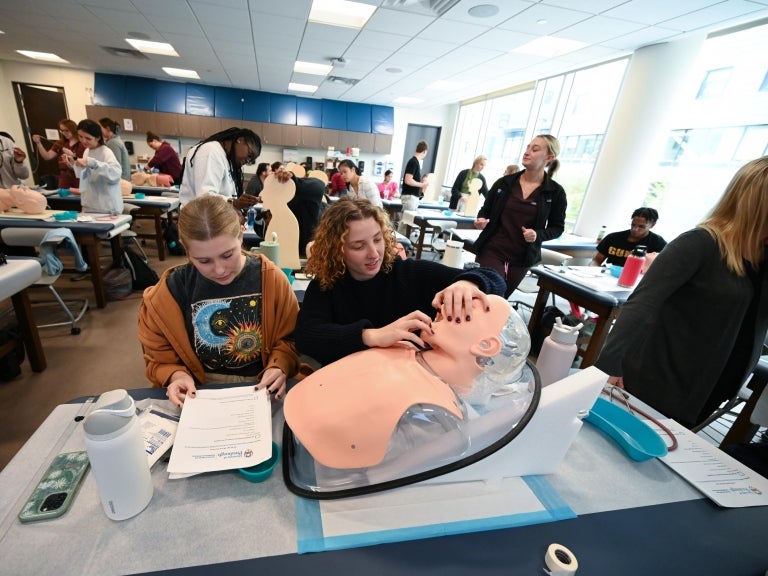
Nasogastric (NG) Feeding Tube Placement Simulation Skills Lab in the Murdoch Building on Pitt's Oakland Campus.
The Center for Interprofessional Studies (CIP) at the School of Health and Rehabilitation Sciences (SHRS) supports students’ interprofessional education opportunities through collaborative and team-based care activities.
Earlier this year, CIP announced the recipients of the first Interprofessional Educational Seed Award that recognizes faculty, staff and students who engage in projects that enhance interprofessional education for SHRS students across disciplines.
In October, we featured one of the three winning teams, “Street Medicine as an Opportunity for Interprofessional Service Learning.” Read our blog of their update to learn more.
One of the other winners was the “Nasogastric (NG) Feeding Tube Placement Simulation Skills Lab,” a collaboration between the Dietitian Nutritionist (DN), Emergency Medicine (EM) and Physician Assistant Studies (PAS) programs. The awarded proposal sought to amplify simulation-based training for students within the three programs while also providing training for clinical instructors.
The team was led by Assistant Professor Trisha Cousins (DN), who served as the primary project director. Co-directors included Assistant Professor Lori Cherok, Assistant Professor Tracy Maluchnik and Instructor Jenee McGurgan (DN); Assistant Professor Julia Dubis, Assistant Professor Christina Davis, Assistant Professor Jamie Hammond and Assistant Professor Tara McSwigan (PAS); and Assistant Professor Nicole Cecchini (EM).
“This innovative educational opportunity would not be possible or sustainable without the grant funding provided by the SHRS Center for Interprofessional Studies Seed Grant,” Cousins said. “Collaborative simulation-based activities have enhanced our SHRS students' education and training as the next generation of health care leaders.”
Implementing the Nasogastric Skills Lab for Students
This project has progressed significantly since the award was given. In October, the faculty and graduate students in the Dietitian Nutritionist and Physician Assistant Studies programs collaborated to execute the nasogastric skills lab. The SHRS CIP Seed Grant allowed the faculty to purchase five patient simulation models to execute an interprofessional simulation lab. The hands-on skills lab spanned over two, two-hour labs which consisted of lecture material and hands-on training on nasogastric tube placement.
The PAS faculty began with a presentation reviewing pertinent anatomy and indications/contradictions/complications of NG tube insertion and outlining the steps for insertion. The students then watched an educational video demonstrating this procedure on a hospitalized adult patient. Before the simulation began, students completed a pre-course survey assessing prior knowledge.
The skills lab included approximately 40 students, and the faculty evaluated their skill sets using a checklist which determined if the students could correctly place a feeding tube in the simulated patient using a step-by-step approach. Lastly, the students completed a post-survey to reevaluate their knowledge and understanding of the procedure. The survey data will be used to identify skill strengths and areas for improvement, provide key takeaways and determine any need for repetition in practice.
Future Plans
In spring 2024, the faculty plan to host an interprofessional education workshop to interested preceptors in the three SHRS programs, including but not limited to NG tube placement, malnutrition screening, glucose monitoring, ethics training and CPR certification in collaboration with the EM program. The Seed grant budget will support the costs for supplies and continuing education for the preceptors.
The results of this Interprofessional Educational Seed Award proposal could be disseminated in several ways including a poster at the annual conferences including American Academy of Physician Associates (AAPAR), Food and Nutrition Conference and Expo (FNCE) and/or Society for Academic Emergency Medicine (SAEMR). In addition, this would be appealing to several journals as an example of how to add innovative teaching approaches into graduate level accredited programs.
Stay tuned for further updates on this initiative and an update on the third Seed Award winner, “Using Mainstream Smart Technology as Assistive Technology: An Interdisciplinary Course” in upcoming SHRS blogs.
---
Published December 12, 2023
